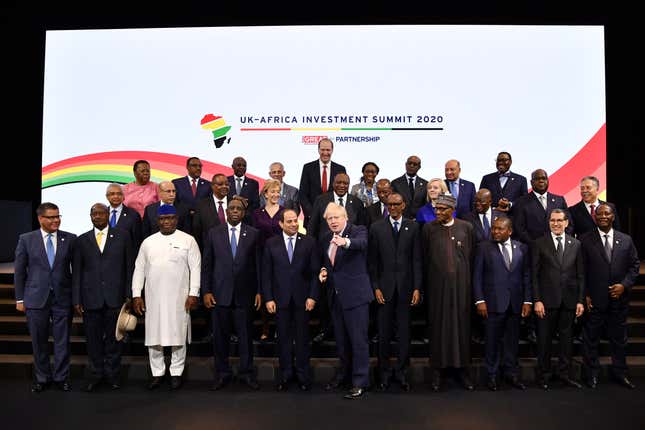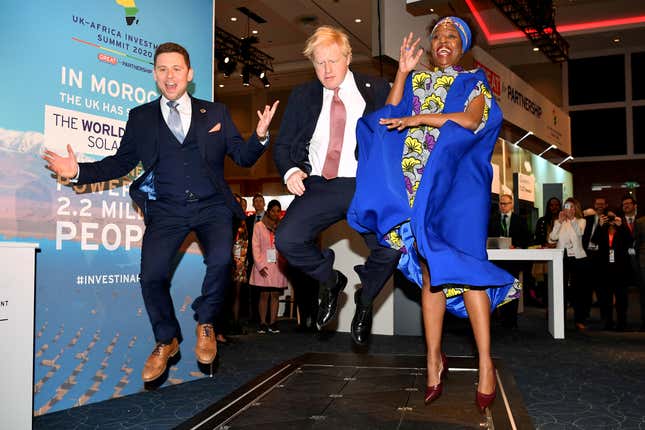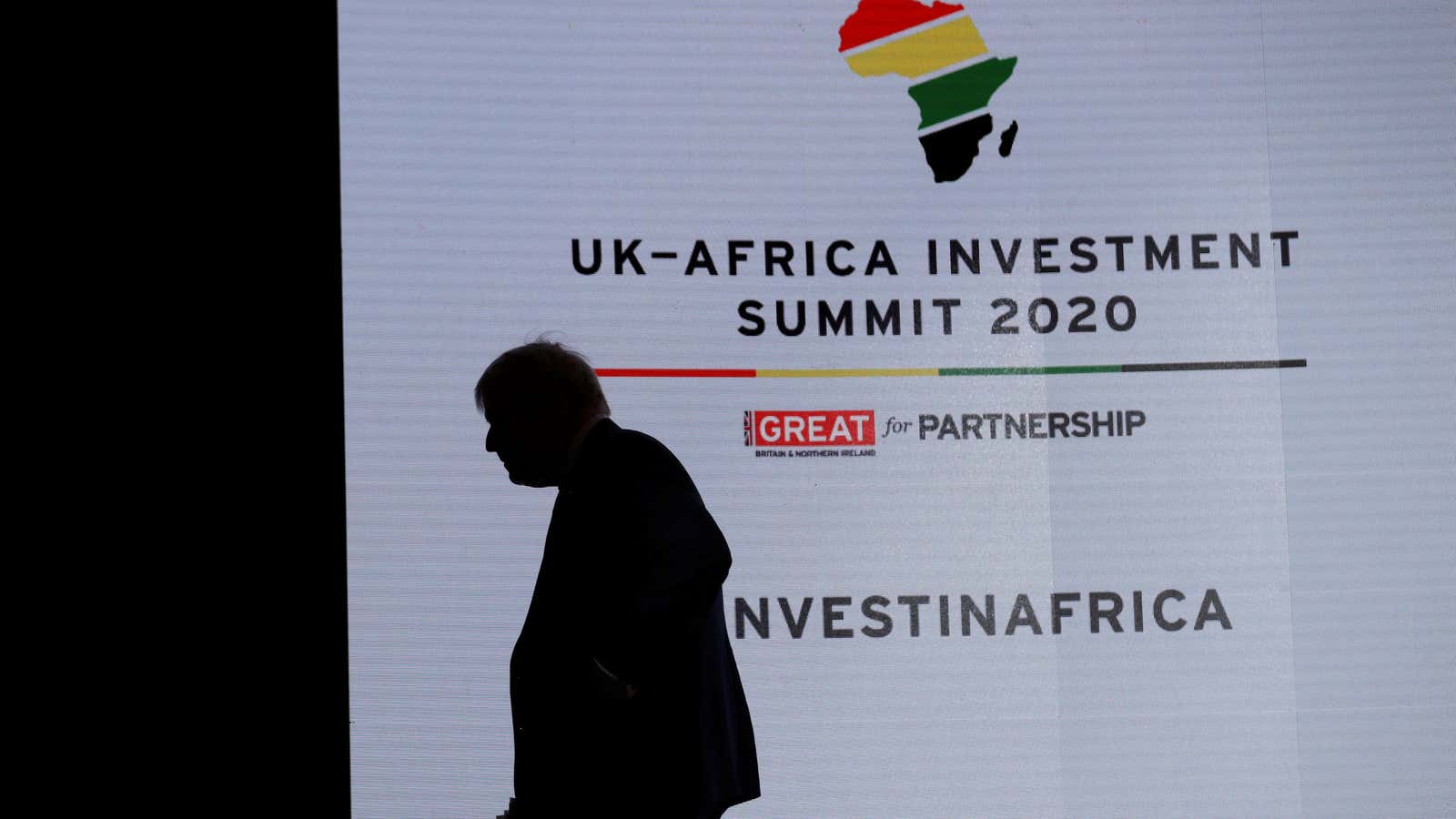The United Kingdom’s secretary of State for International Development Alok Sharma was in Kenya in mid-January, causing a bit of destruction at the Nairobi Securities Exchange along the way.
“I was asked to ring the bell,” he told the audience at the UK-Africa Investment Summit in London on Jan, 20. “I was told to ring the bell with vigor and I did and the top fell off. I explained I was channelling Boris Johnson’s government’s new energy.”
The story—delivered in a style reminiscent of his boss—earned Sharma a few laughs, but the UK usually likes to push a more constructive image with its trading partners these days, at least those outside Europe. Johnson himself likes to boast about the attention he gave to Africa during his two-year stint as foreign secretary when he visited 11 countries on the continent. (He prefers not to reminisce about things he said about Africa before then, such as when he wrote in The Spectator in 2002 “The problem is not that we were once in charge [of Africa], but that we are not in charge any more.”)
The attention Africa is now receiving from the UK government is as much about Brexit as anything else. With the UK on the verge of leaving the European Union (EU) on terms yet to be agreed, it needs to shore up its trading relations with other parts of the world. The likes of Johnson, Sharma and Africa minister Andrew Stephenson often cite two facts in particular: the continent has eight of the 15 fastest growing economies in the world and, by 2050, will be home to a quarter of the world’s consumers. That spells opportunity and a way of mitigating the damage Brexit could do.
But there is a lack of consistency in the UK’s approach. London says it is committed to the continent, but the UK Africa Investment Summit was a one-off event. And while the UK claims to be interested in the entire continent, only 21 countries were invited. The rationale behind that remains murky. One senior government figure said they wanted to focus on countries with the strongest ties or with the greatest potential. Another official added there was “a healthy dose of political perspectives as well.”

The invitees included Guinea and Rwanda, whose trade with the UK is worth less than £30 million a year. Others with more valuable trade like Namibia and Zimbabwe were excluded. Perhaps wary of attracting negative publicity, officials refused to name the invited countries ahead of the summit. The air of secrecy continued on the day, when officials refused to provide a list of speakers.
An awkward underlying truth is that African trade has been in decline for the UK. It accounted for 4.2% of UK trade in 2012, but it has been closer to 2.5% in the past couple of years. Most of that trade is with a small handful of countries. South Africa, Nigeria and Algeria account for more than half of all UK-Africa trade. This is in line with some wider trends. “For all the talk of impact investment, the amount of capital [committed to Africa] is falling,” says Nick O’Donohoe, chief executive of CDC Group, the UK’s development finance agency. “People are pulling back; banks are pulling back. That’s partly because the cost of capital post the financial crisis has gone up. The cost of compliance has caused doing business to be more expensive.”
Brexit is moving things into sharper focus though. To date London has signed trade continuity agreements with 12 African countries, to replace existing trade deals via the EU.
In January 2019 the UK signed an agreement with four eastern and southern Africa countries (Madagascar, Mauritius, Seychelles and Zimbabwe). Trade with them was worth £2 billion in 2018, although in the case of Madagascar it has still only been agreed in principle. Such deals are unlikely to mean an entirely seamless transition though. The UK describes the deal as replicating EU trading arrangements “as far as possible.”
In November, the UK signed an economic partnership agreement with Southern African Customs Union members (Botswana, Eswatini, Lesotho, Namibia and South Africa) as well as Mozambique. That covers trade worth £10.3 billion a year.
The UK has also signed association agreements with Morocco and Tunisia and agreed to mirror the EU’s generalized scheme of preferences, which will give 35 other countries reduced or zero tariffs into the UK. Other continuity agreements with Algeria, Cameroon, Côte d’Ivoire, Egypt, Ghana and Kenya are still under negotiation.
While the UK is keen to push its credentials as a broad-based trading partner, it is focusing on a few areas in particular, such as the City of London, technology and infrastructure.
At the summit, the UK government announced £1.5 billion ($2 billion) of initiatives, including £350 million to develop sustainable infrastructure projects. London is also setting up “infrastructure partnerships” with Egypt, Ethiopia, Ghana, Kenya and Uganda alongside the African Development Bank (AfDB), with the aim of generating billions of pounds of private sector investment in sustainable energy, transport and telecoms.
There was plenty of commercial activity too, with 27 deals worth more than £6.5 billion ($8.5 billion), including a £167 million investment by brewer Diageo in Kenya and a £222 million deal by NMS Infrastructure to build six hospitals in Côte d’Ivoire.
The UK’s approach has been criticized by some campaigning groups though. An open letter to the government from 12 organizations including Global Justice Now and the Jubilee Debt Campaign said it “seems to be less about effective development and more about promoting British business interests.” From a London perspective, the two things go hand-in-hand though. “The key to development is stimulating private sector growth, stimulating growth in exports, stimulating job creation. Those are the things that raise everybody’s standards of living,” says O’Donohoe.
For African countries there is opportunity amid the potential Brexit turmoil, with a chance to insist on better trade terms from a UK under pressure to offset the damage of reduced access to the EU. No wonder AfDB president Akinwumi Adesina told the summit “Don’t get scared of Brexit. You can exit and look the other way and Africa will be there.”
The opportunity to raise funds in London is one many are interested in. Kenya launched a $40 million green bond on the London Stock Exchange on the morning of the summit and others may follow. “The stock exchange of London can be a pivot for a new relationship with continental Africa, with countries like my own,” said Ghana’s president Nana Akufo-Addo.

Officials and ministers in London acknowledge the overriding short-term priority is to minimize the impact of Brexit. “This is about avoiding disruption,” said the senior government figure. “We don’t want any disruption when we leave the EU. We want it all to continue seamlessly.”
However, the UK-Africa relationship may yet come in for disruption if the machinery of government in London changes, as per recent rumours. Johnson is expected to reshuffle his cabinet in February and Department for International Development (DfID) may suffer. Initial suggestions it would be merged into the Foreign and Commonwealth Office have abated, but it could still lose its seat at the cabinet.
Nonetheless, the government insists that any changes won’t alter its Africa policy and it vows to stick to OECD rules around official development assistance (ODA). Indeed, the UK likes to say its trading relations are about far more than profit. “Impact investing can have a huge Impact in Africa,” says the UK’s trade commissioner for Africa Emma Wade-Smith. “It’s not just about returns on investment. We also care about the wider positive impact of doing that business.”
On a similar theme, in his opening speech Johnson said the UK would no longer provide public money for coal mining in Africa. “Not another penny of UK taxpayers’ money will be directly invested in digging up coal or burning it for electricity,” he said. “Instead, we’re going to focus on supporting the transition to lower- and zero-carbon alternatives.”
How much difference that policy will make is open to question. CDC says it already avoids mining – “We don’t do extractives,” says O’Donohoe. And Wade-Smith says it is unrealistic to expect African countries to simply abandon hydrocarbons. “If we want to encourage African growth, we need to be able to power that,” she says, adding the UK has “a real focus on clean energy [to] help Africa transition to a cleaner, greener energy mix, with gas being an important part of that transition.”
Indeed, on the sidelines of the conference, several oil and gas deals were announced. Among them, Savannah Petroleum is investing £315 million in the acquisition of gas assets in Nigeria and Tullow Oil announced a £1.2 billion investment in oil production in Kenya. For all the talk of a new relationship, that suggests that money is heading in the same direction it always has.
Sign up to the Quartz Africa Weekly Brief here for news and analysis on African business, tech and innovation in your inbox
